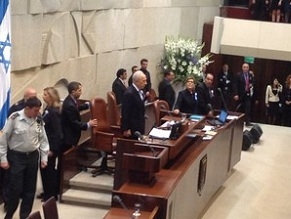|
World Jewish News

Israeli President Shimon Peres opened the inaugural session of the 19th Knesset, the Israeli parliament in Jerusalem.
|
Israeli parliament reopens following elections with the highest new female intake in its history
06.02.2013, Israel The Israeli Knesset convened for a special session Tuesday following national elections a fortnight ago which returned the largest ever turnover of members in the institution’s history, as more than a third of MKs entered parliament for the first time. With a new intake of 48 members, another historical landmark was reached with the largest ever number of females sitting, 27 MKs more than fifth of the parliament.
The ceremonial sitting in the presence of President Shimon Peres came in the wake of his long-anticipated call Saturday night on incumbent Premier Benjamin Netanyahu to form and head a coalition government following January’s indecisive election result, which left voters largely split between centre, left and right-wing political factions. By convention, the Prime Minister has 28 days to form a government, with a further possible a period of 14 days beyond this at the President’s discretion
Accepting the call, Netanyahu opened his weekly cabinet meeting Sunday by asking constituent Knesset groups from across the political spectrum “to join me in as broad a national unity government as possible that would unite the public at a decisive time in our history”.
Citing the continued Iranian nuclear threats as well as domestic budgetary reforms as issues of immediate concern, he told the meeting of outgoing government ministers: “Our goal is to unite the nation around these tasks and not divide it. Only as broad a union of forces as possible will enable us to meet these tasks and to ensure the future of the State of Israel.”
Addressing parliament Tuesday, Peres said the early elections had imbued the Knesset with “renewed confidence and renewed legitimacy”, as he conceded the increased female representation was “an achievement but still far less than the equality we seek”.
Invoking the significant domestic and foreign challenges facing the Jewish State, he said time would tell whether these constitute “existential threats or new opportunities”, as he heralded the scorn-free atmosphere of the elections and reminded members they were there to represent the nation. The Knesset should “serve the nation more than rule over it”, he insisted.
Turning his attention to the post-Arab Spring landscape in the Middle East, he said the current storms were a product of dissatisfaction amongst the youth of those countries and a yearning for independence. Slamming Iranian “terror agencies such as Hezbollah and Hamas”, he cited Iran’s repeated attempts to delegitimise Israel and to pull the wool over the eyes of the international community regarding its nuclear ambitions, concluding: “They do not tell the truth and they denigrate the individual. They are the deniers of enlightenment in our time.”
Praising close ally US President Barack Obama for his increasingly tough stance on Iran, which has seen his chosen incoming defence candidate Chuck Hagel forced to retreat of his former preference for an uncompromising sanctions policy, he continued: “The United States can put an end to the Iranian threat and I believe that the President of the United States is determined to do it.”
“There is no security without an army and no peace with diplomacy. Peace requires security mechanisms and security requires diplomatic mechanisms. We made peace with Egypt and Jordan. And we started negotiations with the Palestinians. If we complete the negotiations, we will create a strategic depth which each of the components alone is missing. In Jewish tradition, peace is a traditional obligation. David Ben Gurion summed it up in one sentence: "Israel's fate is determined by its strength and is righteousness," he added as he rounded out his address.
EJP
|
|
